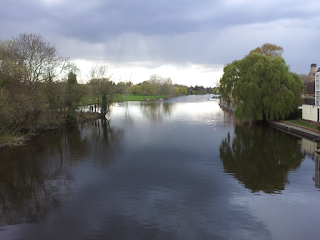Some believers (Jews, those who follow Jesus, and Muslims) take the early chapters of Genesis literally and therefore hold that Adam and Eve were real people, created at the same time as the world itself, the stars and planets, and other forms of life. There are, however, many others who hold that the creation stories are not intended as history but have some deeper purpose.
An overwhelming majority of scientists on the other hand see Adam and Eve as mythical figures. But sometimes we hear them speak of 'Mitochondrial Eve' and 'Y-chromosomal Adam'. What do they mean by those terms? Is there scientific evidence for a first man and a first woman?
We will try to understand the story of Adam and Eve from the beginning. We'll look at the views of faith in this post and science in a later one and we'll see if they can be reconciled in some way.
Two accounts - This is based mainly on the Hebrew writings known as the Tanakh, what Christians call the Old Testament. The main place where origins are mentioned is in the early part of the book of Genesis. There are many references to Adam and Eve elsewhere in both Old and New Testaments and those generally support what we find in Genesis.
Genesis describes the creation of the universe as known at the time of writing, it includes the origin of the stars, the sun and moon, the earth itself, all living things, and the first man and woman. This article ignores much of that and focusses solely on Adam and Eve.
There are two passages that deal with the first people, Genesis 1:26-28 and Genesis 2:7-25.
In the first account plants are created first (Genesis 1:11-13), then the Sun, Moon and stars (Genesis 1:14-19), birds and fish (Genesis 1:20-23), land animals (Genesis 1:24-25) and finally mankind (Genesis 1:26-28). There is no mention of Adam and Eve here, instead the collective word for mankind is used, people are created but the number is unspecified.
In the second account the order is significantly different. This time Adam is created first (Genesis 2:7), then the trees (Genesis 2:8-17), then the land animals and birds (Genesis 2:19-20) and finally Eve (Genesis 2:21-22). This time there are only two people.
Since the two accounts follow different sequences it is a logical necessity that they cannot both be historically correct. Either of them might be correct, or neither, but both is not possible. Therefore the only conclusion that can be defended is that either or both of these accounts were written for some purpose other than history.
The real purpose - What might that other purpose be?
I would strongly suggest that the purpose of Genesis chapters 1 and 2 is exactly the same as that of the rest of the Bible.
- It is to reveal something of the nature of the power behind the universe.
- It explains our broken relationship with him.
- And it points to the reconnection that became possible in Christ.
Genesis 1 and 2 tell us there's a creator who brought the universe into being. This creating power is not part of the universe.
Relationship, not history - The original intention was that we should have freedom of will and freedom of action to use in honouring the Creator, but instead we abused our freedom. Initially we had a close relationship with our Maker (walking together in the garden with our Father). Our significance, worth, security and identity were found in our love relationship with him. But after our revolt for independence we found ourselves... independent! And it was not a good place.
Woman now looked to man for her significance, worth, security and identity. And man looked to the ground to provide these things, through the work of his hands raising crops. This remains true today; women tend to look to a relationship, men to their own ability. That's a generalisation but it contains the essence of a deep truth.
In Christ we have the relationship restored and with it the opportunity to walk again with the Creator in the garden and find our significance, worth, security and identity in the right place once more.
This is the meaning of Genesis 1 and 2 in a nutshell. It is far, far more significant and important than any element of history that might be contained in those chapters. The order in which things were made is of no significance at all. We sometimes miss the wood for the trees! We build up the importance of the unimportant and run the risk of overlooking the real nuggets of gold placed here for our benefit.
Adam and Eve represent the first humans (and indeed all of us), of that there is no doubt. But that is as far as I'm able to go. Others will, of course, hold different views and that is fine by me. We can share an understanding of the spiritual truth without agreeing on the historicity of Genesis 1 and 2.
Adam and Eve represent the first humans (and indeed all of us), of that there is no doubt. But that is as far as I'm able to go. Others will, of course, hold different views and that is fine by me. We can share an understanding of the spiritual truth without agreeing on the historicity of Genesis 1 and 2.
Questions:
- How do you reconcile the accounts of creation in Genesis 1 and 2?
- Does the sequence of creation make any difference to the underlying spiritual truth?
- Can we love one another despite our sometimes wide diversities of understanding?
See also:
- Adam and Eve - Wikipedia
- Image of God in Genesis - Till he comes
- Place of women - Journeys of heart and mind
- Speaking of Adam and Eve - Rightly dividing the word of truth
- Spiritual intent, forever faithful - Life with da man CD




